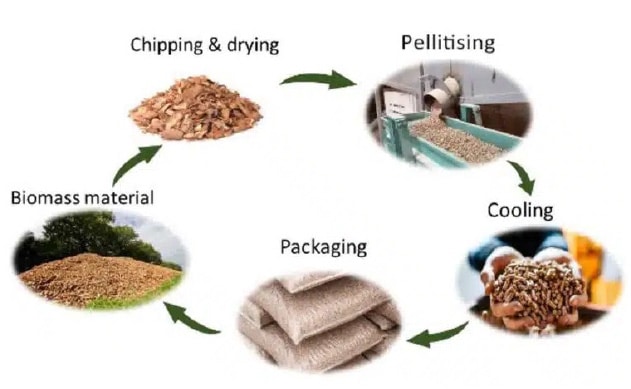Developing and demonstrating on-farm pelletisation technology to process energy crops and agricultural residues year-round
Pelletising on Farm:
An Opportunity to Diversify and Deliver Energy Security Benefits
Demonstration of on-farm pelletisation technology: Developing and constructing a robust mobile pelletiser, enabling farms to process a range of feedstocks.
Biomass can play a key role in the UK achieving net zero ambitions – but transporting it can be inefficient and costly. That’s why a new project is developing mobile pelletising technology to enable farm-based, decentralised processing of energy crops and agricultural residues.
“The UK is heavily reliant on imported biomass pellets – which has implications for energy security”
Background
The UK government and Climate Change Committee both identify domestic biomass feedstock supply as integral to the UK’s net zero journey.
However, within the typical centralised production approach, raw biomass feedstocks are transported off the farm as ‘bales’ – which are bulky and have low energy density in relation to size and weight.
These are hauled to power plants for pelletisation, which produces a compact, energy dense, durable and efficient solid fuel. Pellets are easier to store and handle – and cheaper to transport.
Currently, the UK is heavily reliant on imported wood pellets; some 7-9m tonnes are imported every year. This both puts the UK on the back-foot for net zero and has implications for energy security.
“We’ve been engaging in consultation with farmers – it’s been a lot of listening and learning to understand their needs as participants, and as an industry”
Project
Seeing an opportunity to make impactful change, White Horse Energy has embarked on an innovation project as part of the UK Government-funded Biomass Feedstocks Innovation Programme (BFI) to develop, build, and demonstrate mobile pelletiser technology.
The project seeks to decentralise the current processing model. Pelletising on-farm or at localised hubs would remove the inefficiency and cost of bale transportation, unlocking a domestic source of sustainably produced pellets.
Working with a leading German engineering company and a specialist UK-based electrical company, the collaboration is developing a transportable pelletiser that can process a range of energy crops and agricultural residues into pellets, year-round.
The project also wants to unlock a significant new supply of domestically produced, sustainable biomass feedstocks for the UK energy market. This would present a new diversification opportunity for UK farmers.
The project is exploring both established and emerging supply opportunities in the UK like sustainable aviation fuel.
Latest
Since commencing phase two of the project in May 2022, the project has defined and designed its prototype, and has started to procure and construct parts for the custom-built technology. Now nearing the end of the construction stage, the team will move to technical final testing before commissioning the technology in May 2024.
An important element of pelletisation is the preparation and storage of Miscanthus and alternative feedstocks for pelletising – testing to find the best and most convenient method to undertake on farm. Last year (2023), the project’s head lead Lucy McIntyre, visited the project’s Miscanthus storage tests to see the outcomes of which there were promising results.
In September 2023, the project visited its engineering partner in Germany to look at the physical progress of the pelletiser and to strategically plan for the next steps. The visit was returned in February (2024) and the partners signed off on the project’s control system; allowing for integration to mechanical assemblies, an exciting step
- The project is currently selecting farm trial sites for a field-testing programme that is due to start in September/October 2024, to generate data and assess the technology in action.
- From these trials it will carry out a rigorous supply chain assessment of the cost savings and carbon benefits to the UK biomass sector and wider energy market.
- Conversations are ongoing with all key stakeholders to refine the technology’s deployment on farm and as part of a network of pellet production hubs. As is also its collaborative effort with its partners to launch the pelletiser technology in January 2025.
“Transportation of raw biomass feedstocks was identified as an unnecessary cost”
Consultation
To understand the challenges and opportunities for scaled up domestic pellet production, the project has undertaken a comprehensive consultation with stakeholders across the UK agricultural sector and prospective end users, seeking to understand:
- Feedstock availability and future supply
- On-farm operation of a pelletiser and test sites for the technology
- How to meet the needs of any participating farmer:
- What securities are they looking for?
- What additional benefits would they be looking for?
- How important is diversifying their income?
- What priority does it hold versus other considerations (land use, labour etc).
- What are the policy challenges and opportunities?
The feedback has been largely positive, with farmers open and interested in the technology and in taking part in farm trials. Many see net zero technology as part of the agricultural industry’s future.
Further Information
To learn more about the Demonstration of on-farm biomass pelletisation project, or to understand how you can get involved, please contact: Lucy McIntyre
- Email: [email protected]
- Tel: 01285 323 808
- White Horse Energy Website: https://www.whitehorseenergy.co.uk/
Return to the Innovation Projects overview

